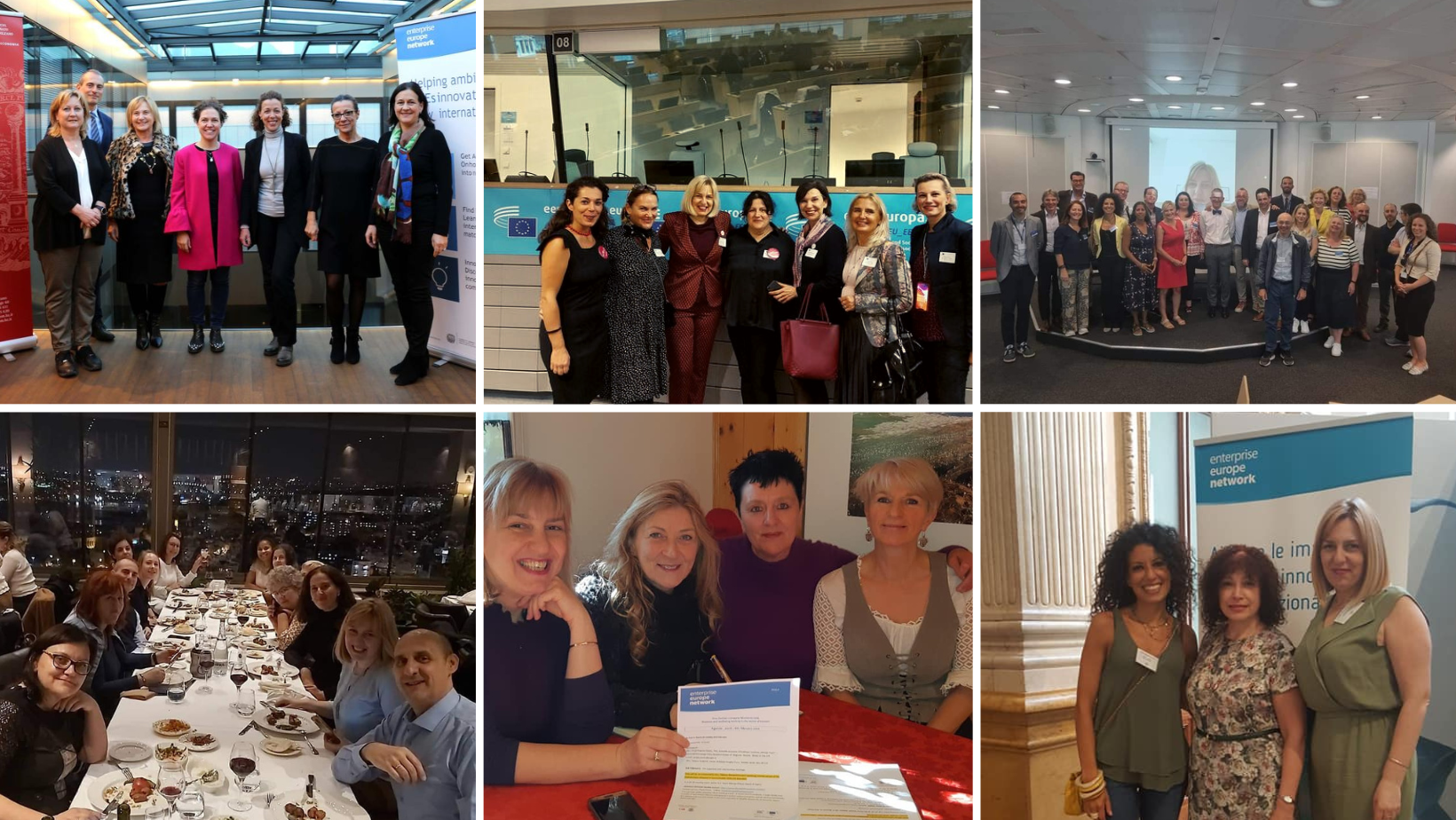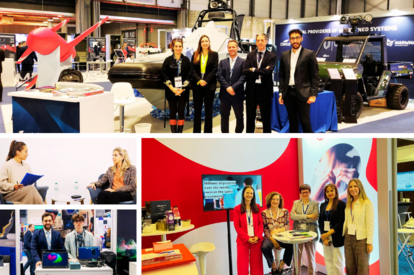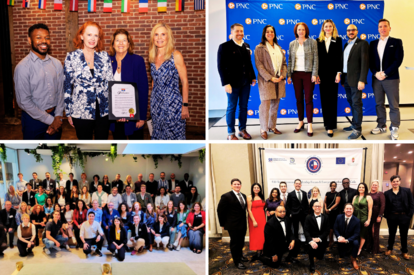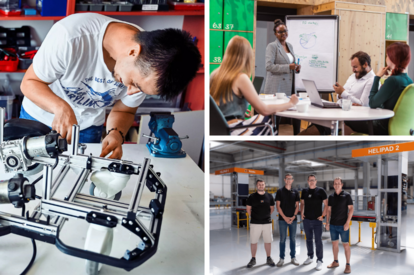
More women than ever are leading small and medium-sized enterprises (SMEs), a promising shift toward greater inclusivity in business. Yet, female entrepreneurs still face significant challenges, including limited access to funding, persistent gender bias, and a lack of tailored support. The Enterprise Europe Network helps women overcome these barriers through expert guidance, practical tools, and international connections.
The rise of women entrepreneurs
Women entrepreneurs have a powerful impact on their markets, industries, and local communities, driving job creation, innovation, and economic growth. According to the 2021/22 Women’s Entrepreneurship Report by the Global Entrepreneurship Monitor, women represent one-third of early-stage entrepreneurs with 20 or more employees within five years. Moreover, two-fifths of entrepreneurs creating innovative products or services for local and national markets are women, and one in three are introducing new ideas internationally.
However, despite their growing presence, women entrepreneurs still face significant challenges. Financial barriers often limit access to capital and business expertise, while cultural norms, biases, and structural inequalities have traditionally discouraged women from starting and growing businesses. On an individual level, challenges such as fear of failure, a lack of mentors, and limited business networks can erode confidence. As a result, women own only one in three businesses globally. The pandemic has worsened these disparities, with female-led firms disproportionately affected by economic disruptions, according to a European Investment Bank analysis.
Addressing these challenges is crucial, especially as diversity has been shown to drive economic benefits. Data shows that women-led companies outperform those with male-only boards, and lead more meaningful corporate social responsibility initiatives. In response, several initiatives are working to empower women entrepreneurs in Europe. WEgate, for example, is an online platform offering women access to training, mentoring, and business networking opportunities. The European Commission runs several programmes to connect women with business angels, and various networks of female entrepreneurship ambassadors support women in business.
In this ecosystem, the Enterprise Europe Network’s group of experts on women entrepreneurship plays a key role in promoting and supporting women-led businesses, offering tools, resources, and international connections to help them succeed.
Stronger together: the Network’s Women Entrepreneurship group
The Network first created the Women Entrepreneurship group (WEG) in 2013 to help women business owners unlock learning, networking, and mentorship opportunities. The group, which includes over 100 members from various business support organisations, helps women entrepreneurs find new clients, form partnerships, access innovation services, and apply for EU grants. WEG also connects women with national stakeholders and promotes collaboration across countries, working across a range of sectors including IT, textiles, fashion, retail, agrofood, and creative industries.
In addition to supporting individual entrepreneurs, WEG helps expand the Network’s expertise in women entrepreneurship and collaborates with relevant EU services and programmes. Over the years, the group has organised numerous business networking events such as the Voogle Conference and B2B meetings, the Co-Matching Business Matchmaking Event in Kocaeli, and the Torino Fashion Week in Italy. Since 2020, WEG has published an e-catalogue showcasing pitches by successful women business leaders in Europe, promoting cooperation and inspiring more women to take the entrepreneurial leap.
In 2022, WEG underwent a revamp, broadening its scope to focus on two key areas for women entrepreneurs: communication and access to finance. The group now aims to strengthen dialogue among female business leaders, while also providing updated information on EU funding opportunities for women-led businesses.
Breaking barriers: Supporting women in business
In November 2022, WEG organised a pilot pitching event to help female entrepreneurs improve their pitching skills and raise funds for their businesses. This initiative focused on the digital and green transition and targeted female CEOs, (co)-founders, and women in leadership roles at start-ups and scale-ups. Entrepreneurs seeking to scale their services through digital or green technologies were also eligible to apply.
Applicants submitted a two-page summary outlining their business model, goals, and solutions, along with their investment plans. "We received 17 pitches and selected 10 from that pool", said Dr. Popovic-Pantic who leads the Network’s group of experts on women entrepreneurship. "We invited four additional companies to pitch to give even more entrepreneurs access to the Network’s expertise. The event revealed a growing demand for hands-on learning experience", she added. In pitching rooms, women find it harder to secure funding as investors are more risk-averse when it comes to investing in female-led businesses, mainly due to gender biases and lack of data on the success of women entrepreneurs. As a result, women entrepreneurs have to work harder to prove the worth of their business ideas, particularly in traditionally male-dominated industries.
The event provided valuable feedback on pitching techniques from experts in finance, including Network coordinators from the "Access to finance" and the "Scale-up and start-ups" groups, as well as female business angels. Entrepreneurs learned to tailor their investment requests to their specific business needs and build a strong pitch-deck. Dr. Popovic-Pantic remarked, "Our clients were thrilled with the feedback they got from both business angels and experts. We received much praise and encouragement."
One of the participants, Andrea Mladin at Pet Travel Advisor in Serbia, said: "I’m thankful for this experience. I have gained a lot from it and improved my pitch. Now I’m off to the United States to present my venture".
Katerina Gkani from Energy Cooperative WEnCoop in Greece, added: "WEnCoop was thrilled to be part of this event. Women entrepreneurs are making a difference in the digital and green transition sectors", she said. "The juries helped us refine our storytelling and pitching skills".
Diana Andritchi at Synaptiq in Romania concluded, "The event helped us boost our visibility and better understand the Network’s business support services for SMEs and start-ups. I got to practice my pitching skills and gained confidence in communicating with investors".
Sanja Popovic-Pantic, Ph.D, is a senior research associate specialised in the innovation management of SMEs and women’s entrepreneurship. Since 2022, she is the chair of the women entrepreneurship group of experts in Enterprise Europe Network.
Related articles

In a world of saturated markets and shrinking attention spans, innovative SMEs must go beyond great products: they need smart, strategic communication to succeed globally. Discover five powerful tips...

Starting a business on a tight budget? You don’t need a huge marketing budget to see real results. In this article, we’ll share 4 affordable marketing strategies for small businesses, showing you how...

Is Texas your next big opportunity? You’re probably thinking of sizzling fajitas, rugged cowboys, or the sweet sound of Willie Nelson strumming his guitar. Well, Texas has all of that, but it’s also...

Start-ups need funding, mentorship, and networks to scale. Big companies are looking for fresh ideas, disruptive tech, and faster ways to stay ahead. When they join forces, both sides win. Keep...
